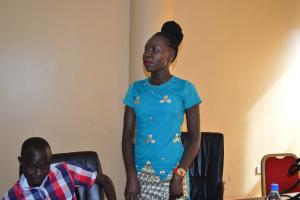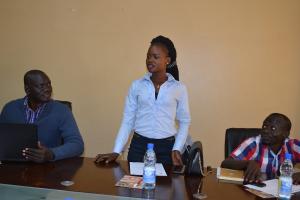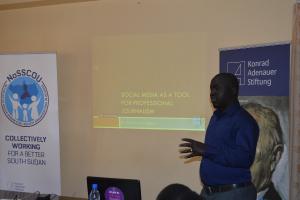Event reports
Unfortunately, the socio-political and economic landscape in South Sudan almost makes it
impossible for professional journalism to thrive. Even the digital media which could have
provided some ray of hope is being abused by people from both sides of the South Sudan’s
political aisle. Similarly, the South Sudanese media practitioners both at home and those
abroad find themselves sorely ill-equipped to tangible play the roles expected of them.
On this basis, KAS in cooperation with the Association of South Sudanese Journalists
(AoSSJU) in Uganda and their umbrella organization, the Network of South Sudanese Civil
Society Organizations in Uganda, facilitated a Workshop Training on professional media
practice for South Sudanese journalists in Uganda on 24 th of May, 2018. Therefore, the
workshop sessions focused on three key issues, namely: hate speech and how to mitigate it,
mobile reporting and ethical reporting. The central aim is to educate South Sudanese reporters
Uganda about effective use of media (both digital and conventional) for peace and
development.
The Event kicked off with welcome remarks by Donnas Ojok, KAS Programme Manager,
followed by opening speeches from Martin Manyiel, representative of AoSSJU and Grace
Andrua, NoSSCOU Representative. Donnas Ojok encouraged the audience to see the network
as a constructive platform in order to launch actions for South Sudan. He emphasized the
important role of journalists in promoting democracy and human rights in that respect.
The introductory session was then follow by a Keynote Address by Joul Nhomgek, a Human
Rights Lawyer who talked about the state of media and its role in information dissemination
in south Sudan and thus roused awareness for problems journalists have to face in South
Sudan. He proposed that the role of journalists should be to dive into politics to ensure
accountability und transparency in order to fulfil their role of informing citizens. But also,
journalists can do investigative work that unearths the deeply entrenched challenges the
affects people. In doing so, they contribute significantly in finding sustainable solutions to this
complex web of challenges.
Sharlotte Kigezo, activist for mental health and psychologist by profession, talked about
Social Media as a tool for professional Journalism and how to use media in the right way. “I
use social media o create social awareness or to participate in social networks.” She initiated a
critical debate about prejudices deriving from wrong use of media, fake news and stereotypes.
“For prejudice not to occur we should be able to understand that we are separate entities as
individuals but made of one full co-related body”. Sharlotte Kigezo thus helped developing
South Sudan correspondents’ social media understanding and skills for mitigating hate speech
online and offline.
Session two focused on the Journalist Code of Conduct and the Ethical Reporting and
Writing. It was moderated by Rodgers Januarius from New Vision Newspaper, who then also
introduces the plenary discussion on reporting and mobile reporting, what it is and why it
matters. He contributed to the workshops aim of broadening the journalist’s knowledge and
skills on ethical reporting and sticking to their code of conduct whiling performing respective
jobs.
The workshop was wrapped up by Tito Anthony, Centre Coordinator from the Centre for
Peace and Justice, thanking participants for their constructive contributions and emphasizing
the positive outcome of the concluded workshop.






